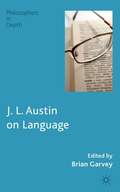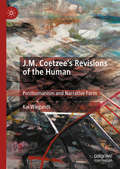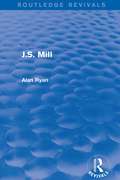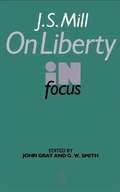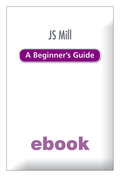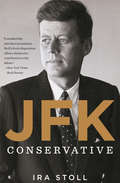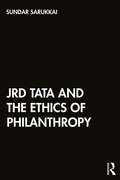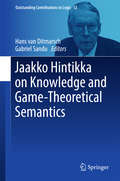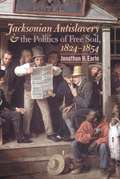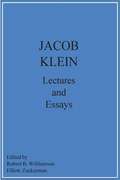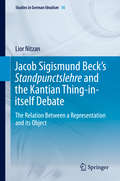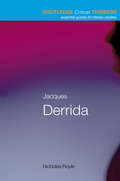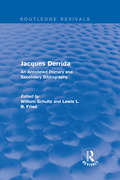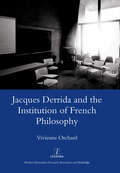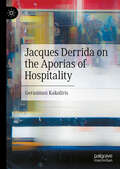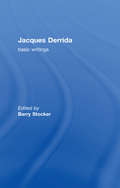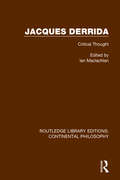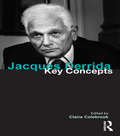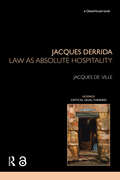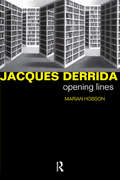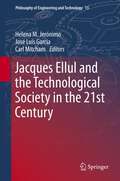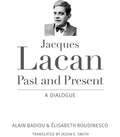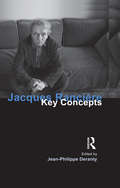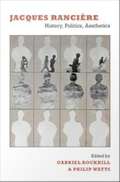- Table View
- List View
J.L. Austin on Language
by Brian GarveyLooking at the work of J. L. Austin, who subjected language to a close and intense analysis, this book deals with his examination of the various things we do with words, and with the philosophical insights he believed could be gained by closely examining the uses of words by non-philosophers.
J.M. Coetzee’s Revisions of the Human: Posthumanism and Narrative Form
by Kai Wiegandt“Kai Wiegandt’s study offers a nuanced, thoroughgoing and deeply engaging account of novelist J.M. Coetzee’s revision of our core ideas of the human—not least the human sense of uniqueness that we have invested in our belief in reason and conviction of God-likeness. He persuasively analyses the careful ways through which Coetzee deploys narrative as a mode of thinking through such human and post-human questions, so developing a fresh and original approach Wiegandt calls ‘anthropological realism’. Drawing on thinkers from across the French, German and Anglophone traditions, Wiegandt has produced a fiercely insightful and committedly interdisciplinary study.” — Elleke Boehmer, Professor of World Literature in English, University of Oxford “J.M. Coetzee’s Revisions of the Human offers a bold and compelling argument that is sure to make a serious intervention in Coetzee criticism. Wiegandt introduces several new fields of enquiry in relation to Coetzee’s fiction; the discussions thus reframe well-worn debates in an innovative way, making for unexpected insights in seemingly familiar critical terrain. The book opens up a valuable and thought-provoking perspective on Coetzee’s work, and will be of particular interest to the philosophically-minded Coetzee specialist.” — Carrol Clarkson, Professor and Chair of Modern English Literature, University of Amsterdam "Tracking skilfully across the shifting terrain of J. M. Coetzee’s fictions, Kai Wiegandt draws out their philosophical and literary intertexts in this lucid, erudite and compelling book, and thereby illuminates a fundamental concern that has persisted throughout Coetzee’s career: to probe and push our ideas of what it is to be human." — Jarad Zimbler, author of J. M. Coetzee and the Politics of Style This study argues that the most consistent concern in Coetzee’s oeuvre is the question of what makes us human. Ideas of the human that stress language use, reason, self-consciousness, autonomy and God-likeness are revised in his novels via a ‘poetic of testing’ which pits intertextually referenced ideas against each other in polyphonic narratives. In addition to examining the philosophical provenance of questions of the human in the work of such thinkers as Plato, Hegel, Heidegger, Barthes and Foucault, the study charts Coetzee’s reconfiguration of elements drawn from major literary precursors like Cervantes, Heinrich von Kleist, Kafka and Beckett. Its leading argument is that Coetzee revises the Enlightenment idea of the human as a disengaged, autonomous thinker by demonstrating the limitations of reason; that he instead offers a view of humanity as engaged agency, a view most compatible with ideas developed in the discourse of post humanism, theories of materiality and social practice theory; and that his revisions depend on narrative form as much as they recommend a narrative approach to ideas in general.
J.S. Mill (Routledge Revivals)
by Alan RyanFirst published in 1974. As logician, economist, political theorist, practical politician and active champion of social freedom, John Stuart Mill is a figure of continuing importance. In this book the author does full justice to the range of Mill’s achievements, providing an introductory guide to his most important and best known writings including Autobiography, A System of Logic, Utilitarianism, Liberty, and The Subjugation of Women. In their treatment of his works, the author seeks to emphasise Mill’s approach to those issues — education, the conflict between social order and individual freedom, the unresolved state of the social sciences, rights and duties of citizens in a democratic state — which remain most alive to us today. At the same time Mill is seen as part of his own age, responding to the anxieties that beset his contemporaries. This book will be of interest to students of politics and philosophy.
J.S. Mill's On Liberty in Focus (Philosophers in Focus)
by John Gray G. W. SmithThis volume brings together J.S. Mills On Liberty and a selection of important essays by such eminent scholars as Isaiah Berlin, Alan Ryan, John Rees, C.L. Ten and Richard Wollheim. As well as providing authoritative commentary upon On Liberty, the essays reflect a broader debate about the philosophical foundations of Mill's liberalism, particularly the question of the connection betweenMill's professed utilitarianism and his commitment to individual liberty. Introduced and edited by John Gray and G.W. Smith, the book will be of interest to students of Mill, to ethical and political philosophers and to anyone interested in the contemporary status of liberalism.
J.S. Mill: A Beginner's Guide Ebook Epub
by Michel PetheramThis useful guide introduces you to the great liberal philosopher. He was very much a liberal thinker and many of the issues that concerned him are still vital today. Chief among his works is the long essay ""On Liberty"", published in 1859, which remains a vivid statement of the rights of the individual in relation to the society in which he or she lives. Many contemporary debates, such as censorship of films and books, gay rights, and legalization of soft drugs use arguments that device from this important work. It is a basic text in courses in political theory and, unusually for such texts, it is an inspiring work to read. Other works covered are ""Utilitarianism"" and ""The Subjection of Women"".
JFK, Conservative
by Ira StollIn an era of partisanship and shifting political labels, a fascinating look at just how &“liberal&” President John F. Kennedy actually was—or wasn&’t. &“America, meet the real John F. Kennedy.&” —Washington Times John F. Kennedy is lionized by liberals. He inspired Lyndon Johnson to push Congress to pass the Civil Rights Act. His New Frontier promised increased spending on education and medical care for the elderly. He inspired Bill Clinton to go into politics. His champions insist he would have done great liberal things had he not been killed by Lee Harvey Oswald. But what if we've been looking at him all wrong? Indeed, JFK had more in common with Ronald Reagan than with LBJ. After all, JFK's two great causes were anticommunism and tax cuts. His tax cuts, domestic spending restraint, military buildup, pro-growth economic policy, emphasis on free trade and a strong dollar, and foreign policy driven by the idea that America had a God-given mission to defend freedom—all make him, by the standards of both his time and our own, a conservative. This widely debated book is must reading for conservatives and liberals alike. &“Provocative and compelling . . . Ira Stoll has succeeded in changing our very perception of Kennedy as one of liberalism's heroes."—Weekly Standard &“An informative analysis of the ways in which JFK did indeed evince his conservative side—he was very religious, open to a free market unencumbered by governmental interference, and staunchly anti-Communist.&” —Publishers Weekly
JRD Tata and the Ethics of Philanthropy
by Sundar SarukkaiThis book introduces readers to the ethics of philanthropy, particularly in the Indian context. Drawing on JRD Tata’s philosophy and approach to business, it shows how business and philanthropy were intrinsically related for him. JRD Tata was arguably one of the most influential businessmen in post-Independence India. He was instrumental in not only expanding the Tata businesses but was also known for his impact on the conduct of business as well as his support for various national projects including research and education. He introduced key labour laws in his factories, which later became the model for the Indian government. He was also part of government institutions such as Air India. By discussing ideas such as trusteeship, the notion of profit, the relation between public and private, and social welfare, the book offers an intellectual map of JRD’s thoughts and an original perspective on their significance for an ethics of philanthropy in general. It provides new insights into the nature of ethical problems in the Indian context as well as ways to negotiate with them based on JRD’s work and reflections. It further creates a more meaningful understanding of Corporate Social Responsibility in the present global economy. Lucid and comprehensive, this book will be useful to scholars, researchers and faculty in departments of management and business studies, social work, sociology, economics and philosophy, as well as across social sciences. It will be of great interest to philanthropy organisations, non-governmental organisations, business schools, industry bodies, corporates, and those in leadership and management.
JS Mill A Beginner's Guide (ABEG)
by Michel PetheramThis useful guide introduces you to the great liberal philosopher. He was very much a liberal thinker and many of the issues that concerned him are still vital today. Chief among his works is the long essay ""On Liberty"", published in 1859, which remains a vivid statement of the rights of the individual in relation to the society in which he or she lives. Many contemporary debates, such as censorship of films and books, gay rights, and legalization of soft drugs use arguments that device from this important work. It is a basic text in courses in political theory and, unusually for such texts, it is an inspiring work to read. Other works covered are ""Utilitarianism"" and ""The Subjection of Women"".
Jaakko Hintikka on Knowledge and Game-Theoretical Semantics
by Gabriel Sandu Hans Van DitmarschThis book focuses on the game-theoretical semantics and epistemic logic of Jaakko Hintikka. Hintikka was a prodigious and esteemed philosopher and logician, and his death in August 2015 was a huge loss to the philosophical community. This book, whose chapters have been in preparation for several years, is dedicated to the work of Jaako Hintikka, and to his memory. This edited volume consists of 23 contributions from leading logicians and philosophers, who discuss themes that span across the entire range of Hintikka's career. Semantic Representationalism, Logical Dialogues, Knowledge and Epistemic logic are among some of the topics covered in this book's chapters. The book should appeal to students, scholars and teachers who wish to explore the philosophy of Jaako Hintikka.
Jacksonian Antislavery and the Politics of Free Soil, 1824-1854
by Jonathan H. EarleTaking our understanding of political antislavery into largely unexplored terrain, Jonathan H. Earle counters conventional wisdom and standard historical interpretations that view the ascendance of free-soil ideas within the antislavery movement as an explicit retreat from the goals of emancipation or even as an essentially proslavery ideology. These claims, he notes, fail to explain free soil's real contributions to the antislavery cause: its incorporation of Jacksonian ideas about property and political equality and its transformation of a struggling crusade into a mass political movement.Democratic free soilers' views on race occupied a wide spectrum, but they were able to fashion new and vital arguments against slavery and its expansion based on the party's long-standing commitment to egalitarianism and hostility to centralized power. Linking their antislavery stance to a land-reform agenda that pressed for free land for poor settlers in addition to land free of slavery, Free Soil Democrats forced major political realignments in New York, New Hampshire, Massachusetts, and Ohio. Democratic politicians such as David Wilmot, Marcus Morton, John Parker Hale, and even former president Martin Van Buren were transformed into antislavery leaders. As Earle shows, these political changes at the local, state, and national levels greatly intensified the looming sectional crisis and paved the way for the Civil War.
Jacob Klein Lectures And Essays
by Jacob Klein Robert B. Williamson Elliott ZuckermanTranscripts of three conversations on liberal education, recorded at a 1977 conference at St. John's College, Santa Fe, are presented. The idea that great books are the best instruments for liberal education is addressed, and it is suggested that great books demonstrate to the student what is possible in the way of inquiry and expression, and that a great book is one that proposes a possible truth.
Jacob Sigismund Beck's Standpunctslehre and the Kantian Thing-in-itself Debate
by Lior NitzanThis book examines the unique views of philosopher Jacob Sigismund Beck, a student of Immanuel Kant who devoted himself to an exploration of his teacher's doctrine and to showing that Kant's transcendental idealism is, contra to the common view, both internally consistent and is not a form of subjective idealism. In his attempt to explain away certain apparent contradictions found in Kant's system, Beck put forward a new reading of Kant's critical theory, a view, which came to be known as the Standpunctslehre, the Doctrine of the Standpoint. Author Lior Nitzan reconstructs, step by step, the historical development of Beck's doctrine. He shows how Beck's unique view is drastically different from that of his contemporaries and presents the relevance of Beck to contemporary debates about the proper interpretation of Kant's notion of objectivity, the refutation of idealism and the role of the thing in itself in Kant's transcendental idealism. In doing so, Nitzan presents a defense of Beck's radical perspective of Kant's theory and claims that some of Kant's negative responses to it may in fact be due more to the adversary academic environment at the time than to Kant's true, well considered, opinion. Jacob Sigismund Beck's Standpunctslehre challenges the two dominant schools in the interpretation of Kant's transcendental idealism--the "two world" and the "two aspect" view. It presents a new way of understanding Kant's transcendental idealism, according to which the thing in itself plays no positive role in relation to the possibility of experience. Moreover, it claims that eliminating the thing in itself as the ultimate object of knowledge is not to admit idealism but in fact is the only way to consistently uphold realism. In addition, the book also addresses the question why, assuming that the proposed interpretation is correct, Kant had chosen not to make his true intentions clear.
Jacques Derrida (Routledge Critical Thinkers)
by Nicholas RoyleThere are few figures more important in literary and critical theory than Jacques Derrida. Whether lauded or condemned, his writing has had far-reaching ramifications, and his work on deconstruction cannot be ignored. This volume introduces students of literature and cultural studies to Derrida's enormously influential texts, covering such topics as: deconstruction, text and difference; literature and freedom; law, justice and the 'democracy to come'; drugs, secrets and gifts. Nicholas Royle's unique book, written in an innovative and original style, is an outstanding introduction to the methods and significance of Jacques Derrida.
Jacques Derrida (Routledge Revivals): An Annotated Primary and Secondary Bibliography
by William R. Schultz Lewis L.B. FriedFirst published in 1992, this book represents the first major attempt to compile a bibliography of Derrida’s work and scholarship about his work. It attempts to be comprehensive rather than selective, listing primary and secondary works from the year of Derrida’s Master’s thesis in 1954 up until 1991, and is extensively annotated. It arranges under article type a huge number of works from scholars across numerous fields — reflecting the interdisciplinary and controversial nature of Deconstruction. The substantial introduction and annotations also make this bibliography, in part, a critical guide and as such will make a highly useful reference tool for those studying his philosophy.
Jacques Derrida and the Institution of French Philosophy
by Vivienne Orchard"Jacques Derrida (1930-2004) was unquestionably one of the most celebrated and reviled French thinkers of the last thirty years. Outside France his influence in comparative literature circles, through deconstruction and other ideas, has been so profound that his personal role as a leader of contemporary French philosophy has been almost overlooked. Perhaps because there is no equivalent in English-speaking countries to the timetabling of philosophy in the French education system, writers on Derrida outside France have not fully appreciated the importance of this political and cultural struggle. In this ground-breaking book, Orchard examines a hard-fought debate of great importance not only to Derrida himself, but also to France's idea of what studying 'philosophy' might mean after the student uprisings of 1968."
Jacques Derrida on the Aporias of Hospitality
by Gerasimos KakolirisThe book systematically presents Derrida’s views on hospitality, as reflected in his texts and lectures from 1995 until his death in October 2004. Derrida’s engagement with hospitality is perhaps the most important and extensive philosophical attempt to respond critically to the growing hostility of many governments worldwide towards specific categories of foreigners, such as refugees and immigrants. Particular emphasis is placed on the ‘aporetic’ nature of hospitality that Derrida describes: namely, that, on the one hand, the provision of hospitality brings us face to face with the hyper-ethical ‘law’ of ‘unconditional hospitality,’ which requires the unconditional reception of the other, i.e. the provision of hospitality to the foreigner without conditions, restrictions or expecting anything in return. On the other hand, the provision of hospitality forces us to face the ‘conditional’ laws of hospitality, which, while establishing a right to and a duty of hospitality, simultaneously restrict hospitality by setting conditions for the arrival and stay of the foreigner. The book also analyses the ‘decision’ and the ‘event’ of hospitality, as well as the unresolved ‘aporia’ at the heart of the ethics of hospitality (or of ethics in general), an aporia or contradiction related to the fact that we cannot be hospitable towards a singularity without ‘sacrificing’ some other singularities. Attention is paid to Derrida’s attempt to open the provision of hospitality beyond humans, that is, to other living beings. Derrida’s views on hospitality are examined in the book in the light of the philosophical thought of Emmanuel Levinas, Immanuel Kant and René Schérer.
Jacques Derrida: Basic Writings
by Barry StockerOne of the most influential and controversial thinkers of the twentieth-century, Jacques Derrida’s ideas on deconstruction have had a lasting impact on philosophy, literature and cultural studies.Jacques Derrida: Basic Writings is the first anthology to present his most important philosophical writings and is an indispensable resource for all students and readers of his work. Barry Stocker’s clear and helpful introductions set each reading in context, making the volume an ideal companion for those coming to Derrida’s writings for the first time. The selections themselves range from his most infamous works including Speech and Phenomena and Writing and Difference to lesser known discussion on aesthetics, ethics and politics.
Jacques Derrida: Critical Thought (Routledge Library Editions: Continental Philosophy #6)
by Ian MaclachlanThis collection of essays on Jacques Derrida, first published in 2004, spans nearly thirty years of critical thinking about Derrida's work. The articles selected here have never previously been collected, yet they are significant contributions that illuminate difficult and important aspects of Derrida's writings. While not seeking to be comprehensive, the volume ranges over the entirety of Derrida's published output and addresses a number of crucial topics, including literature, iterability, the signature, time, alterity, Judaism, metaphor and death. Reprinted here in chronological order of first publication, the essays are complemented by an introduction by Ian MacIachlan which discusses the significance of Derrida's work for our critical thinking.
Jacques Derrida: Key Concepts (Key Concepts)
by Claire ColebrookJacques Derrida: Key Concepts presents a broad overview and engagement with the full range of Derrida's work - from the early phenomenological thinking to his preoccupations with key themes, such as technology, psychoanalysis, friendship, Marxism, racism and sexism, to his ethico-political writings and his deconstruction of democracy. Presenting both an examination of the key concepts central to his thinking and a broader study of how that thinking shifted over a lifetime, the book offers the reader a clear, systematic and fresh examination of the astounding breadth of Derrida's philosophy.
Jacques Derrida: Law as Absolute Hospitality (Nomikoi: Critical Legal Thinkers)
by Jacques de VilleJacques Derrida: Law as Absolute Hospitality presents a comprehensive account and understanding of Derrida’s approach to law and justice. Through a detailed reading of Derrida’s texts, Jacques de Ville contends that it is only by way of Derrida's deconstruction of the metaphysics of presence, and specifically in relation to the texts of Husserl, Levinas, Freud and Heidegger - that the reasoning behind his elusive works on law and justice can be grasped. Through detailed readings of texts such as To speculate – on Freud, Adieu, Declarations of Independence, Before the Law, Cogito and the history of madness, Given Time, Force of Law and Specters of Marx, De Ville contends that there is a continuity in Derrida’s thinking, and rejects the idea of an ‘ethical turn’. Derrida is shown to be neither a postmodernist nor a political liberal, but a radical revolutionary. De Ville also controversially contends that justice in Derrida’s thinking must be radically distinguished from Levinas’s reflections on ‘the other’. It is the notion of absolute hospitality - which Derrida derives from Levinas, but radically transforms - that provides the basis of this argument. Justice must on De Ville’s reading be understood in terms of a demand of absolute hospitality which is imposed on both the individual and the collective subject. A much needed account of Derrida's influential approach to law, Jacques Derrida: Law as Absolute Hospitality will be an invaluable resource for those with an interest in legal theory, and for those with an interest in the ethics and politics of deconstruction.
Jacques Derrida: Opening Lines (Critics of the Twentieth Century)
by Marian Hobson Dr Marian HobsonIn Jacques Derrida: Opening Lines, Marian Hobson gives us a thorough and elegant analysis of this controversial and seminal contemporary thinker. Looking closely at the language and the construction of some of Derrida's philosophy, Hobson suggests the way he writes, indeed the fact he writes in another language, affects how he can be understood by English speakers.This superb study on the question of language will make illuminating reading for anyone studying or engaged with Derrida's philosophy.
Jacques Ellul and the Technological Society in the 21st Century
by Carl Mitcham Helena M. Jerónimo José Luís GarciaThis volume rethinks the work of Jacques Ellul (1912-1994) on the centenary of his birth, by presenting an overview of the current debates based on Ellul's insights. As one of the most significant twentieth-century thinkers about technology, Ellul was among the first thinkers to realize the importance of topics such as globalization, terrorism, communication technologies and ecology, and study them from a technological perspective. The book is divided into three sections. The first discusses Ellul's diagnosis of modern society, and addresses the reception of his work on the technological society, the notion of efficiency, the process of symbolization/de-symbolization, and ecology. The second analyzes communicational and cultural problems, as well as threats and trends in early twenty-first century societies. Many of the issues Ellul saw as crucial - such as energy, propaganda, applied life sciences and communication - continue to be so. In fact they have grown exponentially, on a global scale, producing new forms of risk. Essays in the final section examine the duality of reason and revelation. They pursue an understanding of Ellul in terms of the depth of experience and the traditions of human knowledge, which is to say, on the one hand, the experience of the human being as contained in the rationalist, sociological and philosophical traditions. On the other hand there are the transcendent roots of human existence, as well as "revealed knowledge," in the mystical and religious traditions. The meeting of these two traditions enables us to look at Ellul's work as a whole, but above all it opens up a space for examining religious life in the technological society.
Jacques Lacan, Past and Present: A Dialogue
by Alain Badiou Elisabeth RoudinescoIn this dialogue, Alain Badiou shares the clearest, most detailed account to date of his profound indebtedness to Lacanian psychoanalysis. He explains in depth the tools Lacan gave him to navigate the extremes of his other two philosophical "masters," Jean-Paul Sartre and Louis Althusser. Élisabeth Roudinesco supplements Badiou's experience with her own perspective on the troubled landscape of the French analytic world since Lacan's death—critiquing, for example, the link (or lack thereof) between politics and psychoanalysis in Lacan's work. Their exchange reinvigorates how the the work of a pivotal twentieth-century thinker is perceived.
Jacques Ranciere: Key Concepts (Key Concepts)
by Jean-Philippe DerantyAlthough relatively unknown a decade ago, the work of Jacques Ranciere is fast becoming a central reference in the humanities and social sciences. His thinking brings a fresh, innovative approach to many fields, notably the study of work, education, politics, literature, film, art, as well as philosophy. This is the first, full-length introduction to Ranciere's work and covers the full range of his contribution to contemporary thought, presenting in clear, succinct chapters the key concepts Ranciere has developed in his writings over the last forty years. Students new to Ranciere will find this work accessible and comprehensive, an ideal introduction to this major thinker. For readers already familiar with Ranciere, the in-depth analysis of each key concept, written by leading scholars, should provide an ideal reference.
Jacques Rancière: History Politics Aesthetics
by Gabriel Rockhill Philip WattsThe French philosopher Jacques Rancire has influenced disciplines from history and philosophy to political theory, literature, art history, and film studies. His research into nineteenth-century workers' archives, reflections on political equality, critique of the traditional division between intellectual and manual labor, and analysis of the place of literature, film, and art in modern society have all constituted major contributions to contemporary thought. In this collection, leading scholars in the fields of philosophy, literary theory, and cultural criticism engage Rancire's work, illuminating its originality, breadth, and rigor, as well as its place in current debates. They also explore the relationships between Rancire and the various authors and artists he has analyzed, ranging from Plato and Aristotle to Flaubert, Rossellini, Auerbach, Bourdieu, and Deleuze. The contributors to this collection do not simply elucidate Rancire's project; they also critically respond to it from their own perspectives. They consider the theorist's engagement with the writing of history, with institutional and narrative constructions of time, and with the ways that individuals and communities can disturb or reconfigure what he has called the "distribution of the sensible. " They examine his unique conception of politics as the disruption of the established distribution of bodies and roles in the social order, and they elucidate his novel account of the relationship between aesthetics and politics by exploring his astute analyses of literature and the visual arts. In the collection's final essay, Rancire addresses some of the questions raised by the other contributors and returns to his early work to provide a retrospective account of the fundamental stakes of his project. Contributors. Alain Badiou, tienne Balibar, Bruno Bosteels, Yves Citton, Tom Conley, Solange Gunoun, Peter Hallward, Todd May, Eric Mchoulan, Giuseppina Mecchia, Jean-Luc Nancy, Andrew Parker, Jacques Rancire, Gabriel Rockhill, Kristin Ross, James Swenson, Rajeshwari Vallury, Philip Watts
